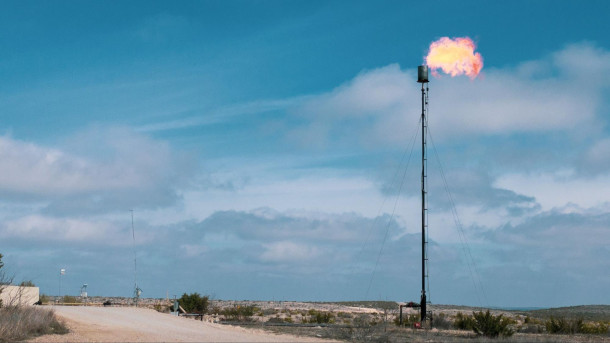Massachusetts Ends Gas Subsidy
Air Date: Week of September 19, 2025

Massachusetts has set a net zero carbon goal by 2050. To make strides in that direction, the Department of Public Utilities is removing a gas subsidy, with the intention of discouraging growth in gas networks, as well as removing monthly surcharges on the bills of current customers. (Photo: Jonathan Cutrer, Flickr, CC BY 2.0)
Many gas bills include a surcharge to help pay for gas connections to new homes. As Massachusetts seeks to phase out fossil fuels the state is now requiring developers to pay for new homes to be connected to natural gas, rather than having rate payers subsidize new hookups that would increase global warming emissions. Inside Climate News reporter Phil McKenna spoke with Living on Earth’s Paloma Beltran about why utilities are on board and more.
Transcript
DOERING: In the last century, when utility companies were building out infrastructure to bring energy and communications to homes, and they got a fixed return on their investments, it seemed only fair that rate payers should help bear the burden. But that was before deregulation and the climate crisis. Massachusetts now has a plan to eliminate the use of fossil fuels by 2050. So, the Bay State is now making developers pay for new homes to be connected to natural gas, rather than having rate payers subsidize new hookups that would increase global warming emissions. Inside Climate News reporter Phil McKenna spoke with Living on Earth’s Paloma Beltran.
BELTRAN: So describe this policy and what it entails. You know, this recent policy that was proposed in Massachusetts.
MCKENNA: Yeah. So basically, there's a new policy in Massachusetts where if you want a new gas connection, you are going to have to pay for it. You being the homeowner, the developer, and that's very different from how it used to be in the past, a utility company would pay that cost and then recoup the cost, pass it on to existing rate payers. And it was interesting to see how the utilities responded to this new policy, largely in favor of it, saying, you know, we recognize the state has these mid-century goals of decarbonizing. We want to take a closer look at it, and the devil may be in the details, but by and large, they were in support of it. It is a subtle shift, but one that could have a significant impact as the state looks to decarbonize, to get off fossil fuels and to electrify home and business heating and cooling.
BELTRAN: And in what instances would gas be the only option here?
MCKENNA: There was one carve out in the policy that said, if you have no other alternative than gas, then we will allow you, the utilities, to pass this cost on to rate payers. I think that's going to be a tiny fraction of homes, you would have to be a home that isn't connected to the electric grid, or, for whatever reason, couldn't use a heat pump for heating and cooling. And I'm really scratching my head to see how that might apply.
BELTRAN: So from what I understand, this new order aims to discourage the expansion of natural gas, as you mentioned. But how does it actively affect existing rate payers who have been subsidizing new gas customers?
Gas utility ratepayers in Massachusetts paid $160 million in 2023 for others to connect to the gas network. New state regulations would have new users pay the costs themselves.
— Phil McKenna (@mckennapr.bsky.social) August 18, 2025 at 9:47 AM
insideclimatenews.org/news/1508202...
[image or embed]
MCKENNA: Right. So last year, existing rate payers, existing gas users, spent $160 million paying for new customers to come online. That comes to about $9,000 for each new gas hookup, and that's something that ratepayers going forward will no longer have to pay. And by also making people who want to get on the gas system pay that and pay it all at once, $9,000 upfront, hopefully discourage them from installing gas in their homes and instead going with electric heating and cooling.
BELTRAN: To what extent do gas customers know their bills help fund new homes, and is that clearly shown in the bill?
MCKENNA: Oh, it's hard to make heads or tails of most utility bills, as you probably know as well. You look at them and there's a lot of small, very small surcharges, and it's not clear what exactly they're funding, and the charges per month are pretty small, but when spread across a large number of users and month to month over time, it can be a substantial, really substantial amount.
BELTRAN: And how has the real estate business reacted to this new policy?
MCKENNA: Realtors were not excited. The Boston Real Estate Board opposed the new measure. They sent in a letter saying, this policy lacks empathy for developers who are trying to build low-cost housing, and it's going to lock us into having to go with something that's more expensive. Interestingly, though, the state shot back, saying, look, you know, we've run the numbers, and there's really no difference in the cost of a new home whether you're building it to hook up to gas or to be all electric. And they said, here in this policy, we're really focusing on trying to get off of fossil fuels, and if we need to deal with the high price of housing, that's something we should definitely be looking at, but looking at elsewhere.
BELTRAN: So if the Department of Public Utility says construction costs are nearly equal, what still stands in the way of a full shift to all electric homes, and how much closer does this policy bring us?
MCKENNA: I think it's one of several levers that the state is trying to pull to further incentivize electrification, decarbonization, and further disincentivize fossil fuel heating and cooling. There's another policy that's being rolled out by the state that will go further to incentivize heat pumps, and that will effectively make it less expensive on your electric bill in the winter if you have a heat pump installed in your home.
BELTRAN: And where does that policy stand?

Phil McKenna is a Boston-based reporter with our media partner, Inside Climate News. (Photo: Laura Ellis)
MCKENNA: That policy is set in stone. It will begin in November, the three major utilities in the state have submitted their plans, what their new seasonal rates will be, and for distribution, the distribution charges on your bill, it's going to be about a third of what it previously was for about six months each year. Overall, that will result in about a 20% decrease in your total bill, because they're, like we said earlier, a lot of different charges on your electric bill, not just distribution, but also generation and other things. And the average home is expected to save about $500 or $600 on their heating bill in the winter if they have a heat pump installed.
BELTRAN: How would these two policies both dealing with the energy transition in Massachusetts, how would they impact the grid?
MCKENNA: Right. So one is discouraging the further build out of the natural gas grid, and the second is incentivizing electrification, which will add more users to the electric grid, more strain on the electric grid, but for the time being, there is plenty of capacity in that grid for additional wintertime use, and that is what drove the state regulators to mandate that there would be lower costs for heat pump users because they felt that they were overcharging those users for their electricity use.
BELTRAN: There's been proponents in Massachusetts asking for the development of a new gas pipeline. To what extent is that necessary in order to meet the energy demands of the state?
MCKENNA: That's a great question. I think a lot depends on our ability as a state and a region to develop offshore wind. There are offshore wind farms that now are near completion and are getting stop-work orders from the federal government. And I think the harder it becomes to develop offshore wind, the more unfortunately, yeah, we may need to look to other alternatives, and the gas pipeline companies would love to expand existing pipelines and ship in more gas, which will provide the power, but unfortunately, will send us in the opposite direction towards our climate goals.
DOERING: Phil McKenna, a Boston-based reporter with Inside Climate News, speaking with Living on Earth’s Paloma Beltran.
Links
Canary Media | "Massachusetts Residents No Longer Must Subsidize New Gas Hookups”
Living on Earth wants to hear from you!
Living on Earth
62 Calef Highway, Suite 212
Lee, NH 03861
Telephone: 617-287-4121
E-mail: comments@loe.org
Newsletter [Click here]
Donate to Living on Earth!
Living on Earth is an independent media program and relies entirely on contributions from listeners and institutions supporting public service. Please donate now to preserve an independent environmental voice.
NewsletterLiving on Earth offers a weekly delivery of the show's rundown to your mailbox. Sign up for our newsletter today!
 Sailors For The Sea: Be the change you want to sea.
Sailors For The Sea: Be the change you want to sea.
 The Grantham Foundation for the Protection of the Environment: Committed to protecting and improving the health of the global environment.
The Grantham Foundation for the Protection of the Environment: Committed to protecting and improving the health of the global environment.
 Contribute to Living on Earth and receive, as our gift to you, an archival print of one of Mark Seth Lender's extraordinary wildlife photographs. Follow the link to see Mark's current collection of photographs.
Contribute to Living on Earth and receive, as our gift to you, an archival print of one of Mark Seth Lender's extraordinary wildlife photographs. Follow the link to see Mark's current collection of photographs.
 Buy a signed copy of Mark Seth Lender's book Smeagull the Seagull & support Living on Earth
Buy a signed copy of Mark Seth Lender's book Smeagull the Seagull & support Living on Earth

